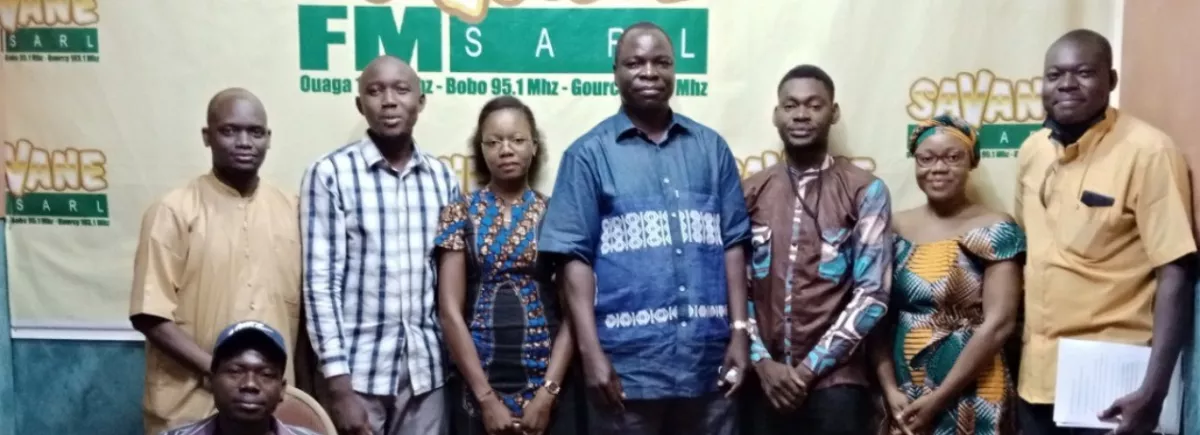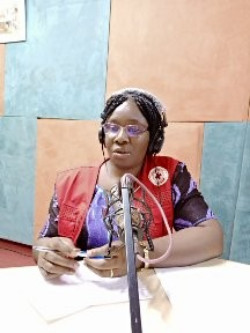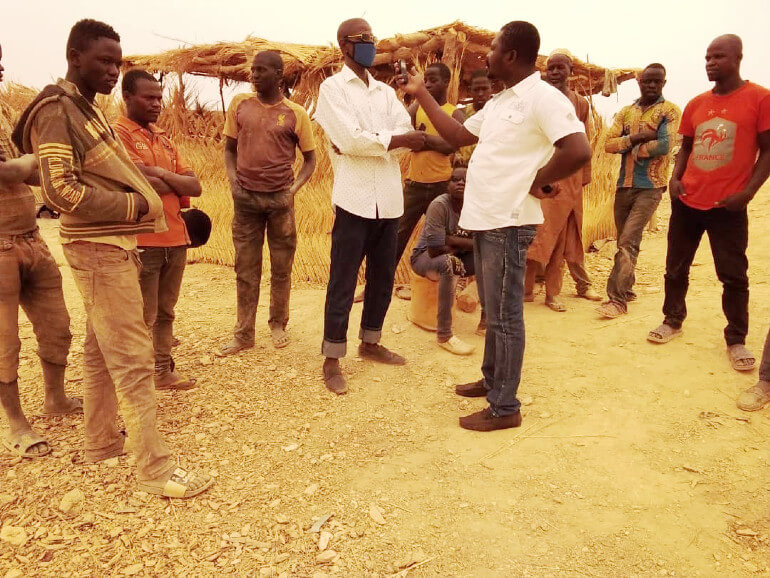
Review of special programmes by UNALFA on COVID-19 in Burkina Faso
In Burkina Faso, the National Union of Free Broadcasting of Burkina Faso (UNALFA) has produced 36 special programmes on the coronavirus and the role of young people in providing a response to the pandemic. These programmes, broadcast in French and local languages on around sixty private and public radio stations, covering the whole country, have been an overwhelming success with young people. Take a closer look at this nationwide initiative.
In April 2020, through its special programme called Vaincre le Covid-19, les radios s’engagent [Overcoming COVID-19: Radio stations get involved], UNALFA set itself the challenge of guiding and supporting the Burkinabe people as they face the issues related to the spread of the virus within the country. Designed as a communal platform for providing news and information and raising people’s awareness, in French and local languages (Mossi, Dyula, Fulfulde and Gourmantché), this programme aimed to provide visibility for those working on the front line in the battle against the pandemic, the civic initiatives for showing resilience, and the opinion leaders.
Thanks to panels made up of health professionals, listeners were able to benefit from clear, scientifically verified information. That was the case for one teacher, in particular, listening in the provinces. In her opinion, “in the provinces, it’s easier to access information on the radio than on TV, so it was good for us to have this programme. The information given by the programme on the protective measures to take, the symptoms and how to behave in the event of suspected infection, really helped me to understand the disease and to protect myself and those around me better. And in my job as a college teacher, it was surprising to see pupils take an interest in the programme and talk about it now and then. Some pupils recognised members of the Jeunes Wakat (Youth Time) team. The Facebook Journalist sketches were also really good. Overall, the programme on COVID-19 taught us a lot, especially for those of us who live some way from the centre”, said a listener from Kouritenga Province.
This community-focused programme, consisting of two complementary sections, helped to raise awareness, and inform and educate people by taking into consideration the worries directly expressed by members of the public. Listeners in fact had the opportunity to raise their questions on WhatsApp in the form of audio or written messages. Answers and explanations were then provided by health professionals who were the guest contributors in the second part of the programme and who could therefore add to and expand on the information shared during the community-focused programme. Use of the national languages meant a large spectrum of the population could be reached, including those in rural areas.
 The editorial team is very satisfied with the success of these programmes, which continued to be broadcast right into June 2020. For Rose Ouédraogo, a journalist and reporter at UNALFA, “the programme was necessary as there were so many false rumours on social media about the pandemic, due mainly to a lack of information. The programme provided explanations and answers from resource persons. Doctors and psychologists were interviewed and these were people who spoke with proof. The programme was intended to inform people and raise their awareness and was really well received”. So, Rose feels “satisfied that we helped to inform the public, provide real information through the various expert contributors and slightly change people’s perceptions about the disease”.
The editorial team is very satisfied with the success of these programmes, which continued to be broadcast right into June 2020. For Rose Ouédraogo, a journalist and reporter at UNALFA, “the programme was necessary as there were so many false rumours on social media about the pandemic, due mainly to a lack of information. The programme provided explanations and answers from resource persons. Doctors and psychologists were interviewed and these were people who spoke with proof. The programme was intended to inform people and raise their awareness and was really well received”. So, Rose feels “satisfied that we helped to inform the public, provide real information through the various expert contributors and slightly change people’s perceptions about the disease”.
Samuel Sawadogo, a journalist and local language correspondent with the Manegda de Kaya radio station (North Central Burkina Faso), says the programmes were “vitally important. That’s evident too from the numbers of regular listeners, who clearly knew the times when they were being broadcast. It was clear they attached importance to them and the subjects that were dealt with particularly interested them. Also, the fact listeners knew the programmes were being broadcast on several different radio stations and that there were experts on the programme helped put things in a different light and listeners took this very seriously.”

Young people, the main target of MediaSahel, the project implemented by the French Media Development Agency (CFI), which led to the Vaincre le Covid-19 les radios s’engagent initiative, also showed real interest in these special programmes. This is largely explained by the many contributions from young people (aged 12 to 40) on the interactive platform set up via WhatsApp, together with the option for them to download the programme to listen to it again.
Listeners, officials and representatives from the various partner radio stations have acclaimed the programme, which succeeded in taking up the challenge it had set itself of being a platform for raising awareness and keeping people informed. Regional correspondents also made a significant contribution, helping to shed light on the problems posed by the pandemic at a local level, while informing people in those areas of the right behaviour to adopt.
Lastly, the collaborative format with local radio stations gave every community the opportunity to be involved in the debate. Messages of encouragement were received on WhatsApp groups too: “Congratulations to the whole team on the great work done. Radio Légende was delighted to contribute, together with UNALFA and all the partner radio stations, to raising the public’s awareness of COVID-19 by relaying the message”, Director of Radio Légende.
And: “It was a great adventure. This programme really helped a lot of radio stations, both in terms of programming and audience. By informing people and raising their awareness, the radio stations helped to avoid the worst. Stay strong, everyone. We are the broadcasters for Burkina Faso”, director of a partner radio station.
In total, 36 radio stations, in addition to MediaSahel’s 24 partner radio stations worked with UNALFA to ensure these programmes were widely broadcast. Moreover, any partner radio stations that wanted to could collaborate on the programme series Covid-19 c’est quoi même?[COVID-19: What even is that?], an initiative arising from a partnership between the Senegalese NGO, RAES and CFI. Certain radio stations broadcast the French version of the programmes while others received support in producing adaptations in their local language.
MediaSahel COVID-19 supports the production and broadcasting of reliable, quality content on the coronavirus, by adapting media content already produced through the MediaSahel project and by offering new information and content to increase awareness.
The organisation benefits from additional funding from the French Development Agency (AFD) as part of the French “COVID-19 – Health in Common” initiative.


